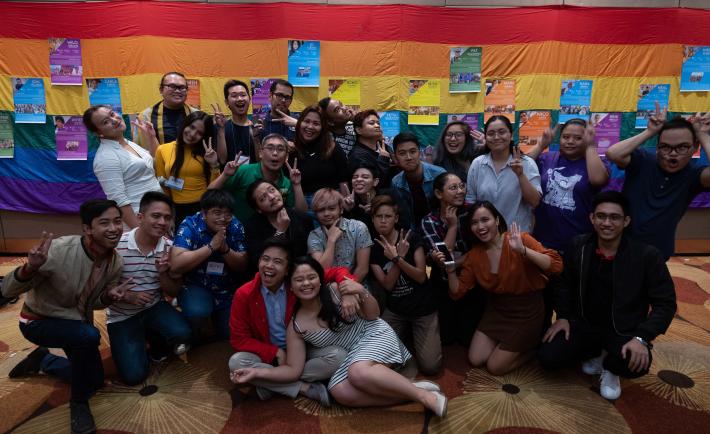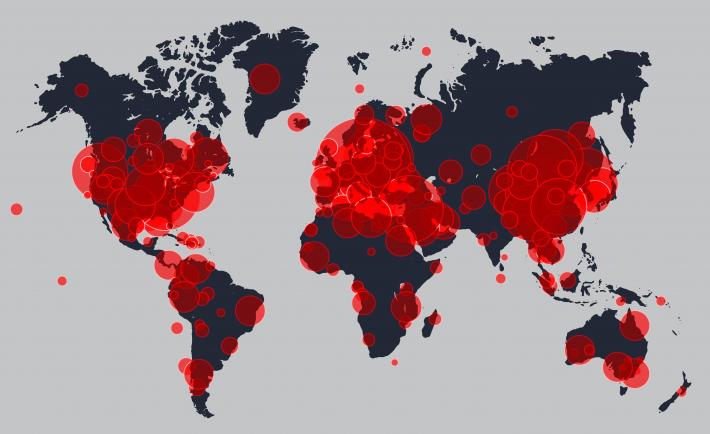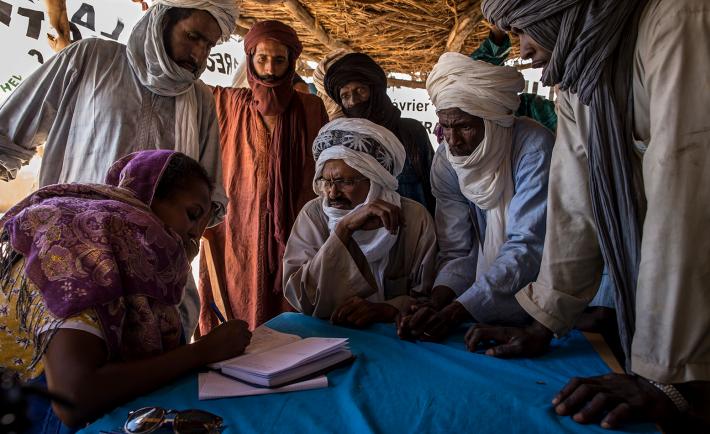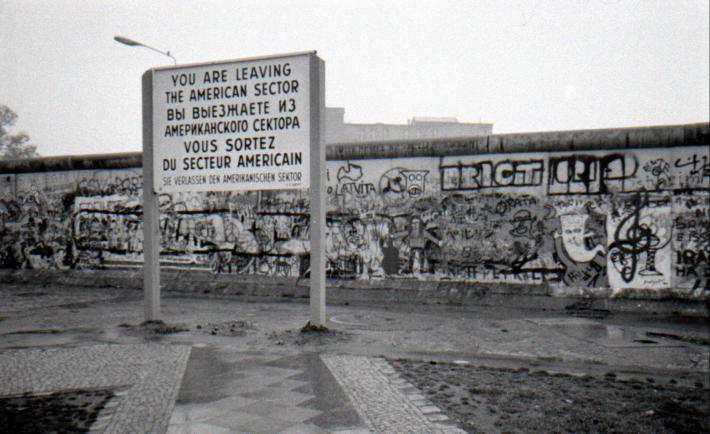Navigating challenging and complex civic spaces is nothing new for local organizations working to advance the rights and inclusion of LGBTI communities. Join NDI Senior Program Officer for Citizen Participation for a conversation with three partners from across the globe working to sustain their advocacy for equality and inclusion, while tackling some of the unprecedented challenges posed by the COVID-19 pandemic.
A Conversation With LGBTI Activists on Community-Building
Governance is Key During COVID-19? (w/ Kristen Sample)
As much as COVID-19 is a health and economic crisis, at its core, it is also a governance crisis.
NDI President Derek Mitchell and new Director of Democratic Governance Kristen Sample delve into ways governments and the international community have risen (or not) to meet the challenges of the COVID-19 pandemic.
NDI’s Governance Approach to Fragile States: People, Processes and Politics
NDI Chairman Madeleine Albright continues to actively support the US Institute of Peace’s Task Force on Extremism in Fragile States, and will participate on January 7 in a USIP, NDI, GW Bush Institute co-hosted event on “A Governance Agenda for Preventing Violence in a Fractured World”.
Can Lebanon’s Parliament Evolve to Represent a New Generation?

Feeling excluded from formal politics, young Lebanese have united with a new spirit of national identity and support for more responsive governance. Credit: Mohammad El Sabeh
Feeling excluded from formal politics, young Lebanese have united with a new spirit of national identity and support for more responsive governance.
*Bonus 04* How does an American organization remain separate form the U.S. government?
As DemWorks first year draws to a close, NDI President Derek Mitchell has one final question for his predecessors, Brian Atwood and Ken Wollack. How, as an American organization, has NDI remained separate from the U.S. government, and how has the issue of democracy support evolved over time?
What is NDI's impact on the trajectory of democratic development? (w/ Brian Atwood & Ken Wollack)
NDI President Derek Mitchell continues his conversation with his predecessors, Brian Atwood and Ken Wollack about NDIs history since the fall of the Berlin Wall. In this episode they discuss NDIs impact on the trajectory of democratic development, and where they see the greatest potential for dramatic democratic change.
See something, say something, do something!
Recorded just blocks from the Brandenburg Gate, NDI’s Robert Benjamin continues his discussion with Zuzana Papazoski about the fall of the Berlin wall and its effect on modern society. With so many questions surrounding democracy, are the lessons learned in the 1990’s still relevant?
How has Europe changed since the Iron Curtain lifted?
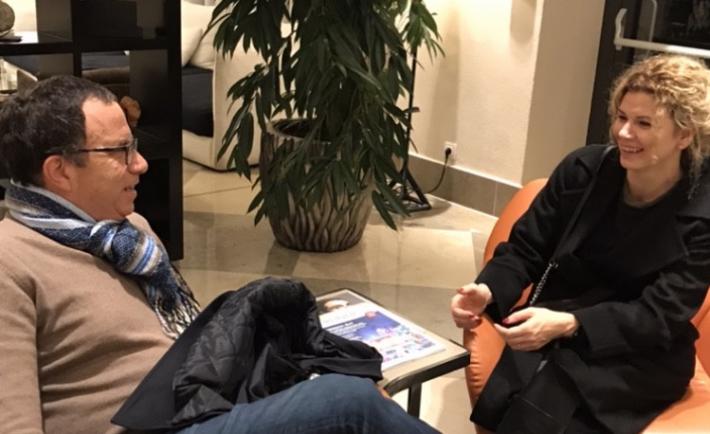
Left to right: Robert Benjamin, Senior Associate and Regional Director for Central and Eastern Europe Programs, and Zuzana Papazoski, Resident Director for Czech Repulic, Slovakia, and Poland
In our second Demworks episode recorded in Berlin, NDI’s director for Central and Eastern Europe, Rob Benjamin talks to Zuzana Papazoski, who currently runs NDI’s programs in Poland, Slovakia, and the Czech Republic. Three decades after the Iron Curtain was lifted, they discuss the dramatic revolutions and democratic change that swept across Europe. How were they driven in great part by young people?
Reflecting on the fall of the Berlin Wall, 30 years on (w/ Brian Atwood & Ken Wollack)
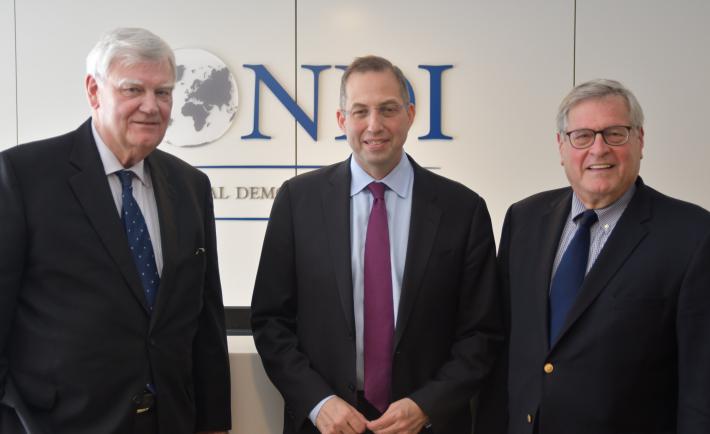
Left to right: Former NDI President Brian Atwood, Current NDI President Derek Mitchell, Former NDI President Kenneth Wollack
In this special episode of Demworks, NDI President Derek Mitchell is joined by his predecessors at NDI, Brian Atwood and Ken Wollack. The three discuss the years before and after November 9, 1989, the day the Berlin Wall fell. Together on this anniversary, they take stock, talking about the evolution of NDI’s work around this period, discussing the specific cases that helped shape the Institute, and reflecting on lessons learned given the state of democracy today.
Demworks Live! Why is political polarization happening now?
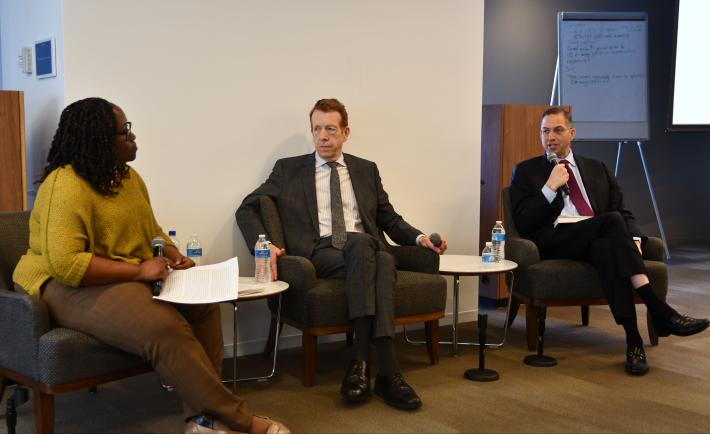
Left to right: Sef Ashiagdor of NDI, Tom Carothers of Carnegie Endowment for International Peace, and NDI President Derek Mitchell.
DemWorks celebrates its 10th episode with a special live installment, discussing the rising threat of political polarization. NDI President Derek Mitchell sits down with renowned global expert on democratization, Tom Carothers of the Carnegie Endowment for International Peace and NDI’s Senior Advisor for political parties, Sef Ashiagdor.
They discuss the points of resilience against severe polarization that exist and the role that political parties play in democracies. Additionally, NDI’s Washington, D.C. staff had the opportunity to ask the panel their own questions on why political polarization is a growing trend for democracies around the world.

